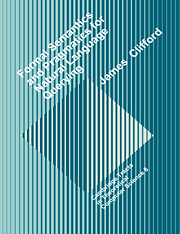6 - Formal Definition of QE-III
Published online by Cambridge University Press: 06 October 2009
Summary
Introduction
In this Chapter we give a formal specification of a simple English Query Fragment, QE-III, for the historical department store database example discussed in earlier chapters. This fragment incorporates all of the features that we discussed in the previous chapter. Towards the end of the chapter we present a Fragment Schema for a QE-III type query language that could be adapted to other domains by defining the relevant vocabulary in the categories of the fragment. The schema and the guidelines for defining such a fragment are intended both to help a database administrator in the process of designing a language for a new domain, and also to show some of the general principles relating aspects of the HRDM model to the query language semantics.
We present the language definition in three parts. First we describe the syntactic component, which consists of defining the categories of the language and the basic expressions of these categories, followed by the rules of formation. Together these constitute an inductive definition of the set of meaningful expressions of QE-III. The semantics of the language is presented next, following Montague's general procedure in PTQ. This consists of giving, for each syntactic rule, a corresponding rule of translation into the logic ILs, for which a direct semantic interpretation has already been specified (in Chapter 2.) Finally, we provide a pragmatics for the language when used in the assumed context of a question-answering system.
- Type
- Chapter
- Information
- Formal Semantics and Pragmatics for Natural Language Querying , pp. 109 - 132Publisher: Cambridge University PressPrint publication year: 1990



